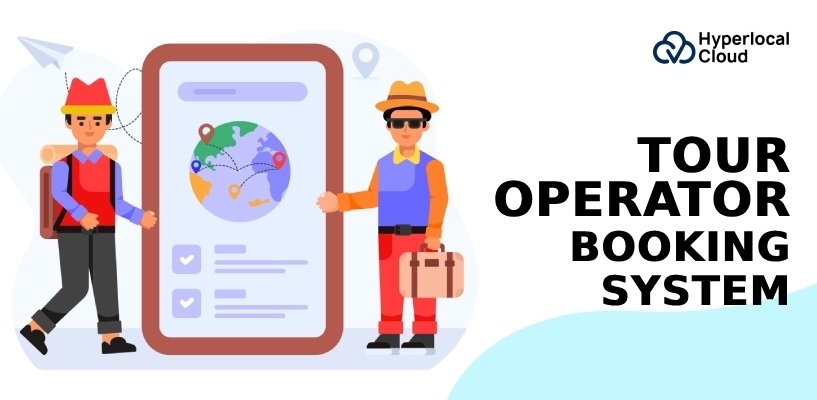White Label Tour Operator Booking System

The travel and tourism industry has been transformed in many ways because of advanced technologies and changing consumer expectations. Rooted at the heart of this transformation is the Tour Operator Booking System, an integrated software platform that streamlines the entire management of tour packages, reservations, and customer relationships with operations. These are the backbones of modern travel agencies, allowing them to perform even simple activities ranging from making itineraries to processing payments.
Technologically, a tour operator booking system is considered one set of tools and features that ride the waves of cloud computing, API integrations, database management, and payment gateways to deliver a smooth booking experience.
This blog post will discuss in detail the meaning of tour operator booking systems, their types, key benefits, how to choose one, their revenue model, and duration.
What is a Tour Operator Booking System?
A Tour Operator Booking System is software built to ensure an easier and smoother booking process for tour operators. It manages reservations, packages, and client interactions efficiently through the system.
It also offers automated confirmation emails, booking tracking, client databases, and reporting tools. The system also assists with inventory management, such as hotel rooms, flights, and tours. Generally, it reduces human error, enhances customer satisfaction, and increases operational efficiency.
Ready to Build Your Own Tour Operator Booking System?
Types of Tour Operator Booking Systems
Identifying the types of tour operator booking systems is necessary to ensure the correct choice. Such systems can be classified into the following broad categories:
On-Premises Systems
These systems can be installed and operated on local servers, giving complete data and infrastructure control. However, they require massive investment in hardware, software, and maintenance. Legacy ERP-based travel management systems are examples.
Cloud-Based Systems (SaaS)
These platforms use cloud infrastructure and are flexible and scalable. They do not require heavy upfront investment and have multi-tenant features like real-time access to information, update capabilities, and solutions such as Salesforce Travel CRM and Travelport.
Hybrid Systems
Hybrid systems combine both on-premises and cloud solutions, offering a balance of control and scalability. They are best suited to operators who need a custom configuration for a tour operator reservation system but enjoy the flexibility offered by the cloud.
Benefits of a Tour Operator Booking System
Implementing a robust tour operator booking system presents various technical and operational benefits:
Automated Workflow Management
It reduces manual involvement for reservations, itineraries, and billing automation. RPA (Robotic Automation Process) and workflow engines make repeated processes more effective.
Data Management Centralization
Creates a single point of truth for data in relation to customers, bookings, and inventory. Relies on relational databases (RDBMS) or SQL databases to handle massive data efficiently.
Customer Experience Enhancement
Real-time booking confirmations, personalized recommendations, and integrated CRM modules improve customer satisfaction and loyalty. AI-driven chatbots can further enhance user engagement for Tour Operator Software.
Scalability and Flexibility
Cloud-based systems offer auto-scaling features, ensuring the platform can handle increased load during peak seasons. Service-oriented architectures support modular and scalable deployments.
Advanced Analytics and Reporting
Built-in Business Intelligence (BI) tools provide actionable insights into customer behavior, sales trends, and operational performance. Data visualization dashboards facilitate informed decision-making.
Seamless Payment Integration
It supports multiple payment gateways and is PCI-DSS compliant to ensure that transactions are processed without issues. Stripe, PayPal, Square, etc., are popular integrations.
API Integrations
Allow integration of third-party services such as airlines, hotels, car rental systems, etc. RESTful APIs and GraphQL are usually preferred to communicate data seamlessly.
Quick Features of Tour Operator Booking System
Here are the following features:-
Real-time Availability
The system provides real-time availability updates, ensuring users have access to the latest information on flights, accommodations, and services. Leveraging advanced data synchronization techniques, it minimizes latency and maintains accurate inventory, crucial for seamless booking processes.
Pricing Management
Advanced pricing management features enable dynamic fare adjustments and promotional pricing strategies. Through robust algorithms, the system can handle complex rate structures, discounts, and seasonal pricing variations, ensuring competitive and transparent pricing for users.
Secure Payment Systems
Integrated secure payment gateways support various payment methods, including credit cards, digital wallets, and bank transfers. The system employs industry-standard encryption protocols (such as SSL/TLS) and complies with PCI DSS standards to safeguard financial transactions and user data.
Custom Itineraries
Users can create personalized travel experiences through customizable itineraries. The platform’s flexible design allows travelers to select destinations, accommodations, and services tailored to their preferences, facilitated by an intuitive itinerary builder with drag-and-drop functionality.
User-friendly Interface
The system’s user-friendly interface is designed for optimal user experience (UX). It features intuitive navigation, clear layout structures, and responsive design principles, enhancing accessibility and reducing the learning curve for new users.
Mobile-Compatibility
Built with mobile-first design principles, the system ensures seamless performance across devices. Its responsive design and native mobile applications provide consistent functionality, allowing users to book and manage travel plans on the go.
Multilingual & Multi-currency Support
With robust multilingual and multi-currency support, the platform caters to a global audience. Language localization and currency conversion are handled dynamically, offering personalized experiences based on the user’s region and language preferences.
Multi-Destination Support
The system efficiently handles multi-destination itineraries, allowing users to plan complex trips involving multiple locations. It synchronizes accommodations, transportation, and services across various destinations, ensuring a streamlined booking process and cohesive travel experience.
Join your digital transformation journey with Hyperlocal Cloud—where technology meets innovation in the travel industry
How to select a Tour Operator Booking System?
Several technical and business factors determine the choice of the right tour operator booking system:
Scalability and Performance
Scalability implies ensuring that the system allows more transactions to be accommodated at a rapid pace without a drop in performance. Platforms should employ load-balancing techniques to distribute traffic well across servers. A CDN optimizes data delivery by caching content closer to end-users. Such optimization reduces latency and enhances the response time for peak usage.
Customization and Flexibility
Customization is the core, and the platform can be customized based on specific business requirements. Modular architecture lets you add custom modules and workflows, while low-code/no-code platforms allow users to create and modify features with minimal coding, making it easier to adjust to changing needs.
Integration Capabilities
Good integration capabilities are critical, especially with existing systems and third-party applications. Open APIs and middleware solutions mean easy data exchanges, making it straightforward to connect to ERP, CRM, or other services outside the business. This means the application can handle complex IT environments without disrupting operations.
Security and Compliance
Regulatory compliance with data security with GDPR, HIPAA, PCI-DSS, etc., is necessary for the platforms dealing with sensitive information. Data encryption, both in motion and at rest, multi-factor authentication (MFA), secure access restrictions, and other data security features favor industry safety standards.
User Experience (UX)
A decent UX/UI is a critical factor in user adoption. Responsive design provides a smooth experience on any device that will be accessed, and frameworks such as React.js and Angular allow for fast, interactive interfaces. The tools deliver a polished, user-friendly environment that positively impacts overall engagement.
Support and Maintenance
Vendor support is essential for downtime minimization. There should be a well-defined response and resolution time so that help can come quickly. Availability of technical support, such as 24/7 help desks or dedicated teams, is also necessary to achieve system stability and address issues on time.
Revenue Model for Tour Operator Booking Systems
A sophisticated revenue model ensures profitability and sustainability. Some of the prevalent ones are:
Subscription Revenue Model
The subscription model provides a recurring revenue stream where customers pay a periodic fee (usually monthly or annually) for ongoing access to a product or service. For tour operating booking systems, this could include offering software as a service (SaaS), cloud storage, or a subscription-based content platform. The predictability of the revenue stream helps the tour operator reservation system plan for long-term growth. However, this model can have high customer acquisition and retention costs due to the need for constant value delivery to subscribers.
Freemium/Hybrid Revenue Model
A freemium model involves offering a free product with essential features and charging customers for advanced features, services, or premium access. For tour operator booking systems, this could mean offering free software with limited functionality and then upselling customers to premium versions with more advanced tools or additional services. The hybrid nature allows a broad customer base but requires careful management of free-user costs and conversion rates, which tend to be low initially.
Advertisement-Based Revenue Model
In an advertising-based revenue model, tour operator booking systems can generate income by displaying advertisements to users or offering ad space on its platform. This is especially applicable if your tour operating booking system runs a content-driven or high-traffic service, such as a marketplace or social media platform. Revenue is generated from advertisers paying for exposure to the platform’s audience, and the model’s effectiveness depends heavily on the size and engagement of the user base.
Commission-Based Revenue Model
The commission-based model allows tour operating booking systems to earn a percentage or fixed fee from transactions completed on its platform. This model is commonly used by online marketplaces, service platforms, or businesses acting as intermediaries. For instance, tour operating booking software could charge a commission on every booking, transaction, or contract facilitated through its platform. While this provides a predictable revenue stream, scalability might be constrained by transaction volume, and the platform would need to ensure a critical mass of users to maintain consistent earnings.
Streamline Your Travel Business: Build a Seamless Tour Operator Booking System Today!
Time and Duration to Build a Tour Operating Booking System
The time and duration of building a tour operating booking system depend on several key factors, such as the complexity of features, the scale of the system, and the resources available. A basic system with core functionalities (booking, payment processing, and itinerary management) might take a few months. In contrast, more advanced systems with additional features (like real-time availability, customer profiles, and integrations with external APIs) could take time.
Several factors influence the development time, including technical complexity, the number of features required, and design quality. Team size and expertise also play a crucial role in speeding up or slowing down the process. Other factors, such as third-party integrations (payment gateways, CRM systems), testing phases, and regulatory requirements (for different regions or payment methods), can also affect how long it will take to complete the system.
Conclusion
An Online Booking System Tour Operator provides much more than just a tool-it provides strategic value, drives operational efficiency, enhances customer satisfaction, and boosts revenue. Cloud technologies, advanced analytics, and API integrations can achieve such transformation in operations and keep up with digitization.
At Hyperlocal Cloud, we specialize in building operator booking system solutions. Our services include expertise in cloud infrastructure, custom software development, and scalable architectures. Whether you require a highly robust SaaS platform or a completely customized on-premises system, our team delivers end-to-end solutions that meet your unique business needs.





